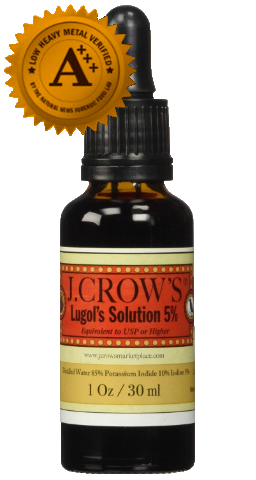Supplements to Increase Fertility in Men
Male fertility and infertility is generally discussed less than female fertility, but for many couples, issues of male fertility are just as important as those of female fertility. And indeed, male sperm quality and the health of the father is also important for an embryo’s development and the child’s health after pregnancy. Although, admittedly, the father’s health at the time of conception doesn’t play quite as significant of a role as the mother’s health (the mother is literally feeding the child from her own body during pregnancy and afterward, after all), male health before pregnancy can still be important for the baby’s health, too.In terms of conception, however, men who have unexplained infertility may benefit from nutritional supplementation to improve fertility. Dietary changes are of course essential for correcting deficiencies and inadequate levels of nutrients, but supplementation with specific vitamins or minerals can also be helpful. Before continuing onward to specific nutrients that can help treat male infertility, note that alcohol consumption, particularly in excess, can severely impact the absorption of most of the nutrients on this list, thus leading to deficiencies over time. Thus, men who have problems with fertility who drink alcohol regularly should consider reducing their alcohol intake (if they haven’t already) to improve their chances of being able to conceive with their partner. Excess cannabis use, nicotine use, and steroid use may also directly affect nutrient absorption.
Vitamin B6
Vitamin B6 supplementation may be helpful for the treatment of male infertility, particularly when combined with vitamin B9 and vitamin B12 (which are discussed in more detail below). Some animal studies have indicated that vitamin B6 deficiency may negatively impact semen quality and some other sperm parameters (such as motility), in addition to interfering with the production of testosterone. The use of vitamin B6 in the treatment of male infertility is somewhat controversial, with some researchers saying that it doesn’t have any significant role at all and others saying that it’s vital. However, since this vitamin works intimately with vitamins B9 and B12, both of which are strongly correlated with increased fertility, supplementation with vitamin B6 is likely to be beneficial overall.It’s work noting that vitamin B6 is also necessary for the production of neurotransmitters like dopamine, some of which are correlated with maintenance of a normal sex drive, positive mood, and diminished stress levels. Because these are all factors related to fertility (or infertility), vitamin B6 may at the very least have a more indirect role in the treatment of male infertility, if not a more direct role as indicated by some studies. Nevertheless, the B-complex vitamins work best when taken together, so men treating infertility with nutritional supplements will need to take some vitamin B6 no matter what in order to have success using the other B vitamins discussed below. Make sure that you’re taking at least 25mg of vitamin B6 per day.
Vitamin B9 (Folate/Folic Acid) in Male Fertility
Folate isn’t just important for women; it’s important for men too, especially when it comes to fertility. Men with adequate levels of vitamin B9 are more likely to have mobile, overall healthy sperm, and are less likely to have spermatozoa with an abnormal number of chromosomes. Damage to sperm DNA is also less likely when a man takes in enough folate, either through dietary sources or through nutritional supplements. Folate may also play an essential role in spermatogenesis (the creation of sperm).Lower levels of folate have been linked to infertility or fertility-related problems in men as well as women in various studies, thus indicating that vitamin B9 may be a valuable nutrient for the treatment of male infertility on a few different counts. For best results, take vitamin B9 in combination with vitamin B12 (these two nutrients work well together, including in the treatment of fertility; incorporate a supplement of vitamin B6 of at least 25mg as well to improve the action of these B vitamins). Folate may be taken in doses of 400-800mcg per day, or even up to 1mg daily.
Vitamin B12 Male Fertility Treatment
I would recommend vitamin B12 supplementation to most people, male or female, who are having fertility problems. This is even more true in cases where a person is a vegan or a strict vegetarian, since these people are highly likely to be deficient in vitamin B12. Since vitamin B12 deficiency often manifests in the form of infertility for younger people trying to conceive, both the man and the woman in a couple trying to conceive will benefit from a higher dose of vitamin B12 (even if the female isn’t deficient, a little extra vitamin B12 will be valuable for when she does become pregnant, and it will improve the health of the fetus and later the child after birth).In men experiencing infertility, vitamin B12 supplementation has been specifically shown to improve sperm counts. When taken orally, vitamin B12 should be given sublingually in doses of 1500mcg per day (make sure the vitamin B12 is in its methylcobalamin form). It will need to be given for between 2-13 months in order to be effective. One study that administered vitamin B12 in this way demonstrated that 60% of the participants experienced improved sperm counts after doing nothing more than taking supplemental vitamin B12.
If you want to speed this process up and ensure increased, improved absorption of this vitamin, you can seek out a clinic that can administer intravenous or intramuscular injections of vitamin B12. If you have a true deficiency, consider weekly or monthly doses of vitamin B12, and incorporate healthy animal products into your diet (if you don’t already eat them) to ensure that you’re getting adequate dietary levels of this nutrient.
Vitamin E in Fertility
Vitamin E is just important for men with fertility issues as it is for women. Though severe deficiency in vitamin E isn’t super common, it’s still interesting to note that deficiency in this vitamin can lead to a degeneration of testicular tissues, which may lead to sterility in men. Supplementation with vitamin E would presumably be able to reverse these effects (as this problem is caused by deficiency, it would logically be treated with nutritional supplementation, like any other deficiency disease).Vitamin E may be administered in doses of between 100-200IU per day for the treatment of male infertility.
Vitamin C and Male Fertility
Vitamin C, like vitamin E, is an antioxidant. In the treatment of male infertility, vitamin C’s antioxidant properties (as well as the fact that it’s a necessary component of sperm) have been linked to increased fertility and reproductive health. One study demonstrated that supplementation with vitamins C and E, along with L-carnitine and CoQ10, improved sperm density and motility when administered together over the course of a 3-month treatment period. This combination of nutrients also reduced the number of abnormal spermatozoa in men with unexplained infertility.Different people choose to take vitamin C in different doses. Many vitamin supplements are available in 350mg or 500mg doses per capsule, which is a good place to start. For the treatment of diseases, some people may take even up to 6000mg daily, which is indicative of the general safety of vitamin C for most of the population. In the treatment of infertility, start with a lower dose and work up to 3000mg if it feels appropriate (if you experience diarrhea or other stomach upsets, back off your dose until these symptoms stop, and then stay with that dose).
Vitamin D and Male Fertility
Men with adequate levels of vitamin D are less likely to develop asthenozoospermia (reduced sperm motility). Deficiency in this vitamin is more likely in people who are vegan or who live in areas with very little sunlight exposure. Individuals with liver or kidney problems may also have lower levels of vitamin D.It’s important to always take supplemental vitamin D with vitamin K2, since the vitamin K2 ensures that the vitamin D will direct calcium into the bones rather than into the arteries or veins. Without vitamin K2, calcium may end up forming plaques in the arteries or veins, which can lead to health problems later in life. Thus, if you choose to take vitamin D, make sure you take it in combination with vitamin K2! Vitamin D can be taken in safely in doses up to 5000IU per day, though combined D3+K2 supplements generally supply somewhat less vitamin D overall.
Getting 30 minutes of sunlight exposure each day is also a good way to get enough vitamin D, since your body naturally produces vitamin D when your skin is exposed to sunlight. Do not wear sunscreen during your 30 minutes out in the sun, and consider eating a Budwig Smoothie while you sit in the sun. This smoothie improves the health of all cells and can improve the production and use of nutrients like vitamin D.
Selenium
Men have an increased need for selenium in comparison to women, similar to how women require more iodine than men. Thus, it’s particularly important for men with fertility issues to consider selenium deficiency as a potential factor in infertility. It’s generally accepted that selenium is important for proper sperm production and motility. In men, selenium is stored in the testes and seminal vesicles, which suggests that it plays a significant role in men’s reproductive and sexual health. This mineral works best when taken in combination with vitamin E; though both of these nutrients have value even when taken separately, their actions are enhanced when they’re taken together.One study that successfully treated male infertility (due to reduced sperm motility) using selenium administered the following combination of nutrients daily over the course of a 12-week treatment period:
- Selenium - 100mcg
- Selenium + Vitamin A combination - 1mg
- Vitamin C - 10mg
- Vitamin E - 15mg
This study (done in 1998) noted that selenium was more valuable in treating male infertility when it was combined with vitamin A rather than being administered alone.
A different study noted that men with infertility had notably lower serum levels of selenium in comparison with men who were fertile and otherwise healthy. Selenium can protect against the effects of oxidative stress on sperm and increases the overall viability of sperm. Some studies have noted, however, that both deficiency and excess of selenium in men can lead to abnormal semen and male infertility, so it’s important to not take too much selenium, too (200mcg taken daily is a good dose for many people).
Zinc
Zinc is an extremely important mineral that participates in many functions in the body, including being an important factor in reproductive health for both men and women. In men, zinc deficiency has been noted as contributing to infertility or fertility related issues. Sterility and low sperm count are both symptoms of zinc deficiency in men, as are low libido and low testosterone levels. Sperm requires zinc in order to be able to swim toward the egg, so low levels of zinc may lead to sluggish, unmotivated sperm (which, of course, isn’t ideal if you’re trying to conceive).Sperm quality is closely linked to adequate levels of zinc. This mineral is associated with higher numbers of sperm in ejaculate fluid, improved sperm viability and motility, and correct spermatozoa structure and integrity of the DNA in sperm. Zinc can also help protect sperm from damage due to bacteria, and protects the chromosomal content of the sperm. Deficiency in zinc may lead to oligospermia (low semen volume), astenozoospermia (reduced sperm motility), and azoospermia (reduced number of live sperm in the semen).
Zinc is also necessary for prostate health in men and can help fight infection and inflammation of the prostate gland, especially in older men, though also in younger men.
Zinc may be taken in amounts of 15mg-60mg per day (start with a lower dose and work your way up when/if you’re ready). If you take a zinc supplement for longer than 1 month, make sure to also take a 2mg (no more) copper supplement as well. Higher doses of zinc can deplete copper levels, so it’s important to supplement with copper to ensure that a deficiency doesn’t develop. If you take zinc in a multivitamin form, make sure that iron is present in the multivitamin in approximately the same amount as the zinc. Avoid taking higher doses of zinc over the long-term, since this can reduce HDL (good cholesterol) levels in some cases, especially in younger men.
Iodine
Iodine is important for male fertility just as it’s important for female fertility. Although women generally have a higher requirement for iodine, men also need iodine and may experience infertility if they’re deficient. Besides improving fertility, iodine supplementation can also help with certain other male reproductive health problems, including prostate cancer and other male reproductive organ cancers, erectile dysfunction, and low libido, to name a few. Iodine is also an essential weight loss/weight regulation supplement, particularly for individuals living in countries like the United States where bromine is prevalent.The dosage of iodine for men is the same as for women. Start by taking 1-2 drops of Lugol’s iodine on your wrist or mixed with water each day, and work your way up to 20 drops daily. Make sure to use Lugol’s iodine (which is a mix of potassium iodide and elemental iodine in water), and do not use the stuff you get at the pharmacy (your iodine that you use for supplementation should not be povidone iodine). Make sure to also take a selenium supplement with the iodine to ensure that the iodine can be absorbed and used effectively.


The AlivenHealthy Iodine Bible - Everything you need to know to get started taking iodine and more!
Magnesium
Magnesium deficiency is becoming an epidemic of global proportions. While not everyone is deficient in magnesium, it’s becoming more and more common to be deficient in this nutrient as magnesium levels get lower and lower in the soils and as more people follow the Western diet of primarily heavily processed foods. In fact, some surveys have suggested that around 80% of the female population and 70% of the male population has suboptimal levels of magnesium.Magnesium deficiency can lead to a long list of symptoms, including:
- Muscle twitches, tremors, and cramps
- Fatigue
- Weakness
- Insomnia
- Constipation
- Mood swings
- Anxiety
- ADHD and other mood disorders
- Loss of appetite
- Arrhythmia
- Heart palpitations
- Epileptic seizures
- Paresthesia
- Osteoporosis
- Migraines
- Heart disease
- Diabetes
- And more…
In regard to male infertility, magnesium is an extremely important nutrient. This mineral has been shown to be essential in the development and growth of sperm cells, in addition to playing a role in the production and release of various reproductive hormones, including FSH (follicle stimulating hormone) and estrogens. As a mineral that’s present literally in every organ of the body, and as an electrolyte responsible for communication between cells, magnesium shouldn’t be overlooked when it comes to the treatment of male infertility.
So, I’m a strong advocate for magnesium supplementation for most people. A daily dose of 150mg of magnesium bisglycinate or magnesium citrate taken in the evening before bed is a sufficient amount in most cases for the treatment of male infertility. It should be taken with selenium and iodine specifically, since selenium increases the bioavailability of magnesium, and magnesium improves iodine absorption.

Related Posts: https://alivenhealthy.com/2022/02/15/infertility-in-women-using-nutritional-supplements-to-increase-fertility/ https://alivenhealthy.com/2021/04/27/l-carnitine-for-infertility-using-nutrients-to-boost-reproductive-health/ https://alivenhealthy.com/2022/04/26/how-to-decalcify-the-pineal-gland-to-treat-female-and-male-infertility/ https://alivenhealthy.com/2022/02/10/vitamin-b-deficiency-treatment-how-to-dose-b-complex-vitamins-for-healing/ https://alivenhealthy.com/2021/04/23/n-acetyl-cysteine-nac-vs-guaifenesin-to-improve-fertility/ https://alivenhealthy.com/2020/03/25/kambo-for-cancer-psoriasis-infertility-cataracts-depression-dementia-and-addictions/ https://alivenhealthy.com/2022/02/10/vitamin-b-deficiency-health-problems-disorders-and-syndromes-caused-by-vitamin-deficiency/ https://alivenhealthy.com/2021/12/29/chlorine-dioxide-and-oxidants-as-medicines-vs-vitamin-c-and-antioxidants-as-medicines/ https://alivenhealthy.com/2021/03/03/vitamin-k2-and-vitamin-d3-for-bone-remineralization-and-cardiovascular-health-cure-osteoporosis-and-arteriosclerosis/
Resources:

 Nutrition, including both a healthy diet and nutritional supplementation, is extremely important for promoting male fertility.
Nutrition, including both a healthy diet and nutritional supplementation, is extremely important for promoting male fertility.














